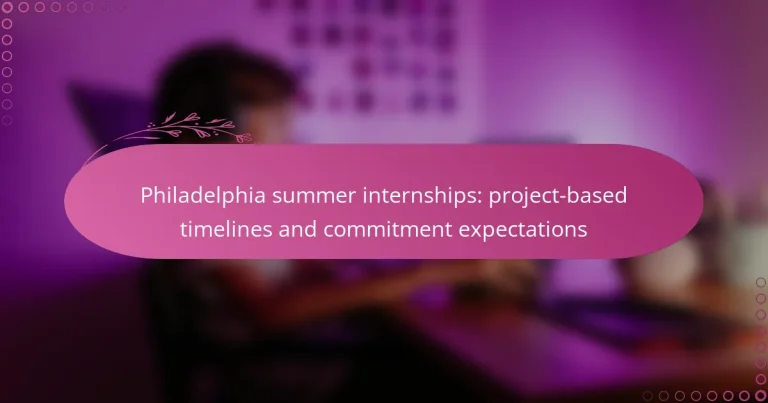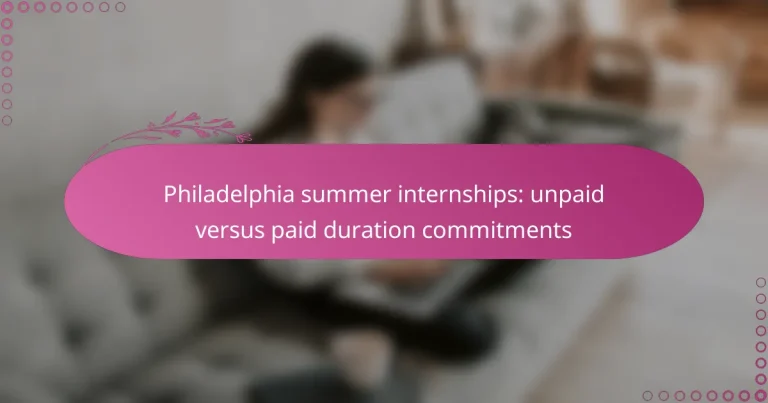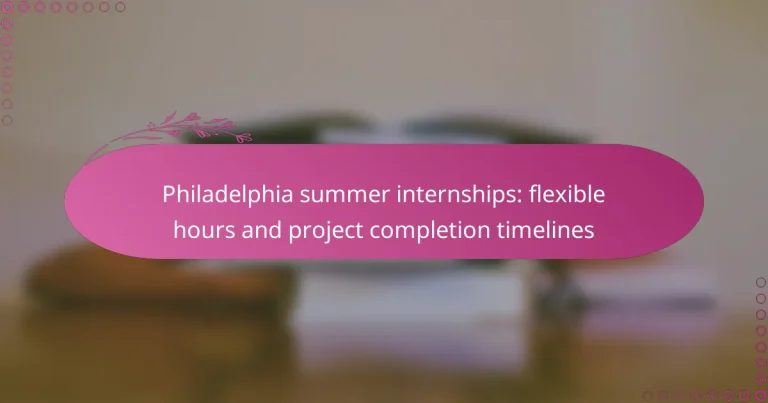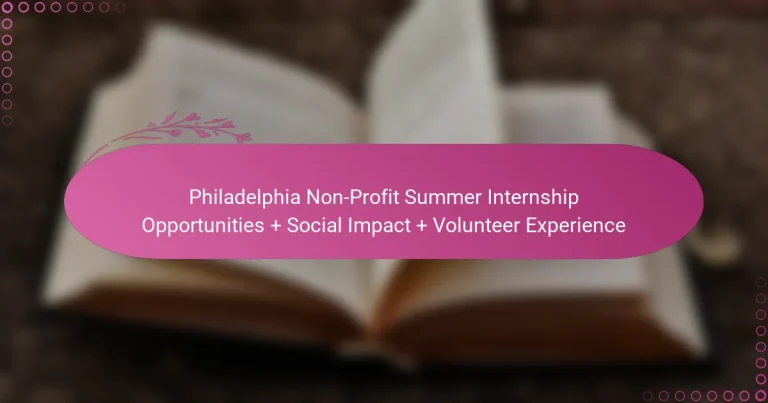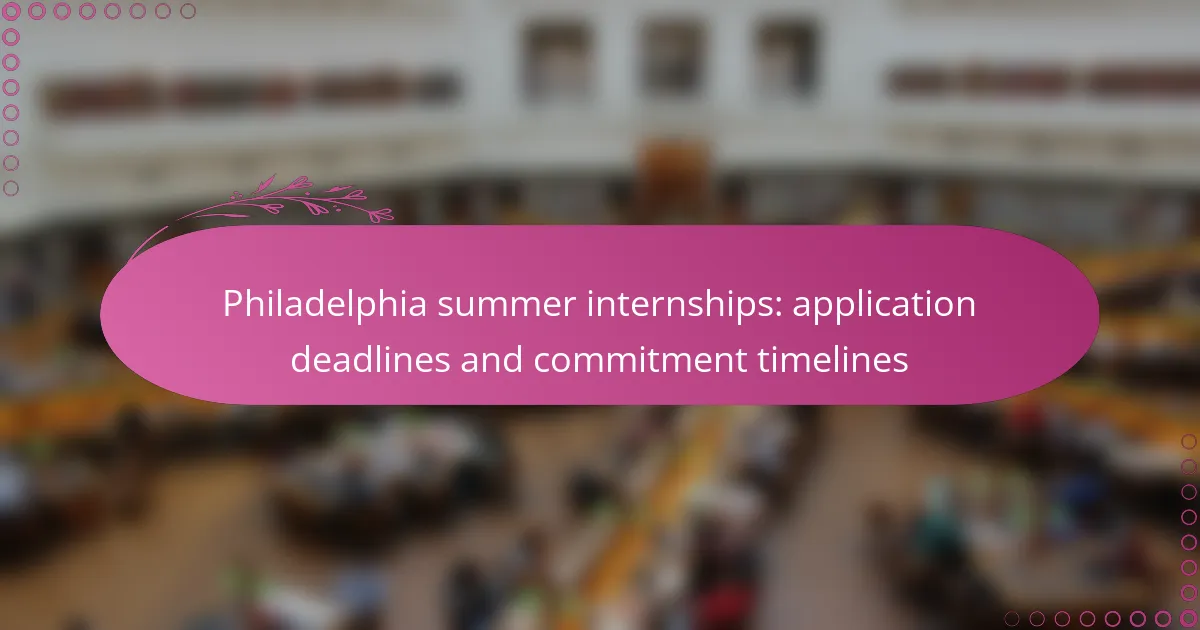

What are Philadelphia summer internships?
Philadelphia summer internships are temporary work opportunities for students and recent graduates in Philadelphia during the summer months. These internships provide practical experience in various fields, including business, healthcare, and technology. Interns typically work under the supervision of professionals, gaining valuable skills and insights. Many organizations in Philadelphia offer these positions, ranging from non-profits to corporations. Internships can be paid or unpaid, depending on the organization and the specific role. They often require a commitment of several weeks to a few months. Applicants usually need to submit a resume and cover letter. The competitive nature of these internships highlights their importance for career development.
How do Philadelphia summer internships differ from other internships?
Philadelphia summer internships often focus on local industries such as healthcare, education, and technology. These internships typically emphasize community engagement and regional economic development. Interns may have opportunities to connect with local organizations and professionals. The duration of these internships often aligns with the academic calendar, running from late May to August. Many Philadelphia internships also offer unique networking events tailored to the local job market. According to a report by the Philadelphia Workforce Development Corporation, summer internships in the city often provide more hands-on experience in community service. This local focus can differ from internships in other cities, which may prioritize corporate environments or broader national industries.
What types of organizations offer summer internships in Philadelphia?
Various types of organizations offer summer internships in Philadelphia. These include non-profit organizations, educational institutions, government agencies, and private corporations. Non-profits often focus on community service and advocacy. Educational institutions provide opportunities in research and administration. Government agencies offer internships in public policy and civic engagement. Private corporations span various industries, including finance, healthcare, and technology. Each type of organization provides unique experiences and learning opportunities for interns.
What industries are most common for summer internships in Philadelphia?
The most common industries for summer internships in Philadelphia include healthcare, finance, technology, education, and non-profit organizations. Healthcare internships are prevalent due to the city’s strong medical institutions. Finance internships thrive because of Philadelphia’s robust banking and investment sectors. Technology internships are growing, driven by the city’s emerging tech startups. Education internships are common, supported by numerous universities and schools. Non-profit organizations offer various internships, reflecting the city’s commitment to community service. These trends are supported by local job market reports indicating high demand in these sectors.
What are the typical application deadlines for summer internships in Philadelphia?
Typical application deadlines for summer internships in Philadelphia range from early January to late March. Most organizations seek to finalize their intern selection by mid-April. Specific deadlines can vary by company and industry. For instance, larger corporations often have set timelines, while smaller firms may be more flexible. Many universities also influence these deadlines through their career services. Students should apply early to increase their chances of securing a position. Research indicates that timely applications significantly enhance internship opportunities.
How do application deadlines vary by industry in Philadelphia?
Application deadlines in Philadelphia vary significantly by industry. For example, finance and consulting sectors often have early deadlines, typically from September to November. Technology companies may have more flexible timelines, with deadlines extending into the spring. Non-profit organizations often have deadlines in the late winter to early spring, reflecting their unique hiring cycles.
Additionally, education-related internships usually align with academic calendars, leading to deadlines in late spring. The healthcare industry may have varied deadlines, often influenced by specific program requirements. Overall, the timing of application deadlines is largely dependent on the nature of the industry and its operational needs.
When should students start preparing their applications for summer internships?
Students should start preparing their applications for summer internships at least three to six months in advance. This timeline allows ample time to research opportunities and tailor applications. Many summer internships have deadlines as early as December or January. Preparing early helps students gather necessary documents, secure recommendations, and refine their resumes. Additionally, starting early can alleviate last-minute stress and improve the quality of applications. Many organizations also prefer candidates who demonstrate proactive planning. Therefore, early preparation is crucial for a competitive edge in the internship application process.
What commitment timelines should applicants expect for Philadelphia summer internships?
Applicants for Philadelphia summer internships should expect commitment timelines typically ranging from 8 to 12 weeks. Most internships begin in late May or early June and conclude in August. Interns usually work between 20 to 40 hours per week during this period. Some organizations may offer flexible schedules to accommodate academic commitments. It is common for internship programs to require a specific start and end date. Applicants are encouraged to confirm these details with individual internship listings. The Philadelphia Internship Consortium provides resources on timelines and expectations for various programs.
What is the typical duration of summer internships in Philadelphia?
The typical duration of summer internships in Philadelphia is around 10 to 12 weeks. Most internships start in late May or early June and conclude in August. This timeframe aligns with the academic calendar of many universities. Interns usually work full-time during this period, averaging 30 to 40 hours per week. Some organizations may offer shorter or longer internships, but 10 to 12 weeks is the most common duration. This duration allows interns to gain substantial experience while contributing to projects. Many employers prefer this length to ensure meaningful engagement.
How many hours per week do summer interns usually work?
Summer interns usually work between 10 to 40 hours per week. This range varies depending on the internship type and employer requirements. Many internships are part-time, with hours often set at 20 to 30 per week. Full-time internships typically require 35 to 40 hours weekly. The specific hours can also depend on the intern’s availability and the organization’s needs. According to the National Association of Colleges and Employers, internships often align with academic schedules, influencing weekly hours.

What factors influence application deadlines for summer internships?
Application deadlines for summer internships are influenced by several key factors. These factors include the industry sector, which dictates the typical hiring timeline. For example, finance and consulting firms often have earlier deadlines compared to non-profits. The size of the company also plays a role; larger organizations tend to have structured recruitment processes with fixed deadlines.
Additionally, academic calendars affect application timelines. Many companies align their deadlines with university schedules to accommodate student availability. The availability of internship positions can influence deadlines as well; if demand is high, companies may expedite their hiring process.
Moreover, the geographic location impacts deadlines; companies in metropolitan areas like Philadelphia may have different timelines than those in rural regions. Lastly, economic conditions can affect hiring practices, leading to earlier or later deadlines based on market demand. These factors collectively shape the application deadlines for summer internships.
How do organizational needs affect internship application timelines?
Organizational needs significantly influence internship application timelines. Companies often align their internship programs with specific project timelines and staffing requirements. For example, organizations may require interns during peak business periods to support increased workloads. Additionally, the availability of resources, such as mentorship and training, can dictate when applications are accepted. Some organizations may have fixed deadlines based on academic calendars. Research indicates that companies with clear project goals tend to establish earlier application deadlines to secure the right talent. Therefore, understanding an organization’s needs is crucial for prospective interns to align their applications accordingly.
What role do academic calendars play in determining application deadlines?
Academic calendars significantly influence application deadlines for summer internships. These calendars outline the academic year, including semesters and breaks. Internship programs align their application timelines with these academic schedules. For example, many programs require applications to be submitted before the end of the spring semester. This ensures that students can participate without conflicting with their coursework. Additionally, some internships may have specific deadlines that coincide with university breaks to accommodate students’ availability. Thus, understanding academic calendars is crucial for students to effectively plan their internship applications.
What strategies can help applicants meet internship deadlines?
Applicants can meet internship deadlines by implementing effective time management strategies. Creating a detailed schedule helps applicants allocate time for each application component. Setting specific goals for each week can improve focus and productivity. Prioritizing tasks based on deadlines ensures that crucial elements are completed first. Regularly reviewing progress keeps applicants on track and allows for adjustments if needed. Utilizing reminders and alerts can prevent last-minute rushes and missed deadlines. Seeking feedback from mentors can enhance application quality and reduce revisions. Finally, maintaining a checklist of required documents ensures nothing is overlooked.
How can applicants effectively manage their time during the application process?
Applicants can effectively manage their time during the application process by creating a detailed schedule. This schedule should include all application deadlines and necessary tasks. Breaking down the application into smaller, manageable steps can help maintain focus. Prioritizing tasks based on deadlines ensures that critical elements are completed first. Setting specific time blocks for each task can improve productivity. Regularly reviewing progress against the schedule helps identify any adjustments needed. Utilizing tools like calendars or task management apps can enhance organization. Research indicates that structured planning significantly increases the likelihood of meeting deadlines.

What are the benefits of participating in summer internships in Philadelphia?
Participating in summer internships in Philadelphia offers several benefits. Interns gain practical experience in their field of study. This experience enhances their resumes and makes them more competitive in the job market. Networking opportunities abound in Philadelphia’s diverse industries. Interns can connect with professionals and build valuable relationships. Many internships also provide mentorship from experienced employees. This guidance can help interns develop skills and navigate their career paths. Additionally, some internships may lead to full-time job offers after graduation. According to a survey by the National Association of Colleges and Employers, 70% of interns receive job offers from their internship employers. Overall, summer internships in Philadelphia provide essential career development opportunities.
How do summer internships enhance career prospects for students?
Summer internships enhance career prospects for students by providing practical experience in their field of study. They allow students to apply theoretical knowledge in real-world settings. Internships also help students build professional networks. Networking can lead to job opportunities after graduation. According to a National Association of Colleges and Employers (NACE) report, 70% of interns receive job offers. This statistic highlights the effectiveness of internships in securing employment. Additionally, internships improve resumes by showcasing relevant skills and experience. Employers often prefer candidates with internship experience. Thus, summer internships significantly contribute to a student’s career development.
What skills can interns develop during their summer internships?
Interns can develop a variety of skills during their summer internships. These skills include communication, teamwork, problem-solving, and time management. Interns often enhance their technical skills relevant to their field. They also gain industry-specific knowledge that can be crucial for their future careers. Networking skills are developed as interns interact with professionals. Interns learn to adapt to workplace culture and expectations. Additionally, they may improve their project management abilities through hands-on experience. Overall, summer internships provide a comprehensive skill-building opportunity for interns.
What resources are available for finding summer internships in Philadelphia?
Online job boards like Indeed and Glassdoor list summer internships in Philadelphia. University career services often provide resources and connections to local companies. Networking events and career fairs in the city offer opportunities to meet employers. Professional associations related to various fields may have internship listings. Local government websites sometimes feature internship programs for students. Additionally, social media platforms like LinkedIn can help find internship postings and connect with recruiters. These resources collectively support students in securing summer internships in Philadelphia.
How can students leverage networking opportunities for internship placements?
Students can leverage networking opportunities for internship placements by actively engaging with professionals in their field. They should attend industry events, workshops, and career fairs to meet potential employers. Building relationships with alumni can also provide valuable insights and referrals. Utilizing platforms like LinkedIn to connect with professionals is essential. Participating in relevant online forums and groups can enhance visibility. Research shows that 70% of jobs are found through networking, highlighting its importance. Moreover, personal connections often lead to internship opportunities that are not publicly advertised.
What tips can ensure a successful internship application process?
To ensure a successful internship application process, start by thoroughly researching the companies you are applying to. Understand their values, mission, and the specific roles available. Tailor your resume and cover letter for each application. Highlight relevant skills and experiences that align with the internship requirements. Networking can significantly enhance your chances. Connect with current or former interns to gain insights and advice. Prepare for interviews by practicing common questions and articulating your motivations clearly. Follow up after submitting your application to express continued interest. According to a survey by the National Association of Colleges and Employers, 70% of internships lead to job offers, underscoring the importance of a strong application.
Philadelphia summer internships are temporary work opportunities for students and recent graduates, providing practical experience across various fields such as healthcare, finance, and technology. The article outlines the unique characteristics of these internships, including application deadlines that typically range from early January to late March, and commitment timelines of 8 to 12 weeks during the summer months. It also discusses the types of organizations offering internships, common industries, and the skills interns can develop, emphasizing the importance of early preparation and networking for successful applications. Additionally, resources for finding internships and strategies for enhancing application success are highlighted.
